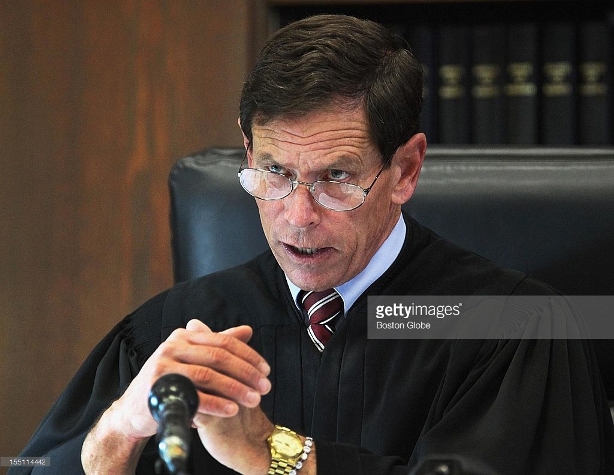| |||||||||
|
|||||||||
|
By:
HARRISON MAINA | |||||||||
| Posted:
Jul,01-2016 09:44:55
| |||||||||
|
(Originally published Wed June 22, Updated Thurs, June 23, 2016, 11.30am) BOSTON--There was shock inside the Norfolk Superior Court yesterday when a clearly upset and disappointed Judge admonished members of the Kenyan All Saints Community church in Quincy near Boston for failure to compromise in good faith to end an ugly dispute at the church built through the goodwill of the community over a 15 year period. To add to the drama, Kenyans were hit with more shock when it emerged that the church pastor, Rev. Fredrick Thanji had enlisted help from two other local clergymen to introduce his church for affiliation with a different Anglican Church denomination based in New York, in a bid to end its current alleged status as an independent congregational church. This, if accepted, would effectively limit the courts' ability to intervene in it's church governance matters as per the First Ammedment of the US Constitution. The developments took place yesterday (Tuesday), when both sides returned to the court for final arguments after failure to come up with a amicable resolution on the highly emotional case after a 4 day witness testimonies were concluded 3 weeks ago before Judge Jeffery Locke.
At the end of the testimonies, the judge decided to postpone the final arguments phase after the two disputing sides assured him in court that they will be committed to finding a compromise on the dispute in good faith rather than having the judge make a ruling that would end up causing irreparable harm to one side. As a result, the judge gave the two sides a three week window in which they would hold elections to fill positions in the church council left vacant when five previous members quit in protest last December, citing hostility, high handedness, lack of tolerance and outright manipulation from the pastor as chair of the council. Once that church council was restored with fully functioning members, both sides had represented to the judge that they would then set up a new subcommittee to search for a new pastor to succeed Rev. Thanji who is due for retirement. However, as soon as attorneys Corina Hale for the suing group and Stephen MacLauhlin for the pastor approached the bench yesterday for their final closing arguments, Judge Locke asked them if they, as well as the two disputing groups, had met to find a compromise in good faith as they has promised during the previous court appearance. "I read the report in my chamber that there was no compromise reached by the two sides since the last time we were here. Before we proceed with anything today, I would like to know two things. First, how many times did you two meet to try and resolve this matter?" Attorney Hale responded and said that she had spoken three times on the phone with her counterpart, Steve MacLaughlin without much success. "They did not. We did not get to that point your honor," Hale continued but was cut short by the judge who at this point had completely lost his cool. "And how many times did the two groups meet in an effort to come up with a good faith compromise as they said they would when we were here last time?" "Well, shame on both sides on this matter. Shame on you for failing to meet and make a minimum effort to come up with a reasonable compromise as you promised here in this courtroom that you would. For this to happen with people who you would otherwise expect to show some good faith effort is very disappointing," the clearly upset judge said. He added that failure by the disputing sides to hold any meeting in search of a compromise indicated that both sides chose to remain in their respective corners and do not want to make any good faith effort to resolve the matter. "This now squarely in my laps and I will decide this matter," Judge Locke continued before asking to submit their final arguments. The judge repeated his earlier contention that US courts are severely restricted by the First Amendment of the Constitution to intervene in internal affairs of religions organizations if there was evidence that the churches are run through some set governing principles, even when such principles may end up being unfair to members. Grilling both attorneys during the closing arguments, the judge threatened to allow the motions to dismiss filed by Rev. Thanji if he found evidence that there was a valid church constitution that served as the governing document--in which case he would send the suing group back to the church to go find their own solutions their own way. "There were two alleged Constitutions, one in 2002 and one in 2012.There has never been a vote in the church on either of these Constitutions," attorney Corina Hale appearing for the suing group charged while urging the court to allow her motion of Preliminary Injunction against the pastor so that they can have an opportunity to go back to the church they are being chased out of and create a new Constitution that would be duly voted for and adopted.
"What if I find that there was there was a Constitution in 2012 and is effective? It is the consequence of this case law that the court steps back as it would be a violation of the first Amendment for the court to intervene," the judge interjected. "I would therefore allow the motion to dismiss and your clients would be left to defend themselves outside the court," the judge said sending shivers among the close to 20 members of the suing group present. Attorney Hale responded confidently, submitting that that the said 2012 Constitution was never approved for voted for in the church, and if the court does not intervene, then there will be nowhere else for the members to go for remedy. "The members asked for the alleged 2012 Constitution so they can vote and approve it but that was never done. I believe that this is a matter for the court to intervene if it finds this church is an independent congregational church and not a hierarchical church," Hale said. Judge Locke also put the defense in a tight spot when their attorney, Stephen MacLaughlin, said that the church had a valid Constitution that was amended and approved in 2012. "Have I ever heard of a church council vote on anything during all the days we have been here?" the judge sought to know. "I am not sure your honor," MacLauhglin admitted after a brief hesitation.
"But whether there was a dispute or not on anything in the church, the church council always solved it even when Rev. Thanji was not present. They didn't have to wait for Rev. Thanji to ratify or vote on anything," Moving along with her closing arguments, attorney Hale maintained that the All Saints Community church was an independent congregational church that was not affiliated with the Anglican Church of Kenya as claimed by Rev. Thanji, and hence the court had jurisdiction to intervene to resolve the current dispute. She said the church was organized as a 501c (3) corporation under Massachusetts laws where no one person was not meant to have to total control of the organization as the pastor currently does. She said that the pastor had over the years made sure that the church operates under no clearly set out rules and regulations other than other than the articles of association filed with the secretary of State and can be viewed online. Hale dismissed the defense arguments that Kenyans in the church used "traditions brought from Kenya" as a way to govern the church in the absence of other clear rules. She said that there were valid concerns that members were in danger of losing the church property as new reports indicated that Rev. Thanji had dispatched two local Kenyan clergymen who are his friends to convince a another US Bishop in New York who oversees a different church denomination to admit Rev. Thanji and All Saints church as an affiliate, even without bothering to consult the members. Hale also said there were plans to have Bishop Wanyoike from the Thika diocese come in September to conduct a confirmation service at the All Saints church against the wishes of the members, even when the disputed matters have not yet been settled. She urged the judge to order that the pastor should not do anything that would change the status of the church especially conveying the church property or interfering with bank accounts. The attorney also urged the judge to allow her motion of injunction against the pastor so that the members can have an opportunity to create a Constitution that will serve the interests of all the members for the healthy running of the church. "This church was built over many years and the 60 members who have paid for it are being chased out. If these members can not be allowed to go back and create a new Constitution to streamline the church, we urge that the court order this church be closed for now until a solution can be found," pleaded the attorney while winding up her closing argument. In response, Attorney McLaughlin said that the suing group's contention that there was nowhere else to go to settle disputes in the church was "simply incorrect" as there was a Church Council that governs the church. He said that records can even show how many times that the council had resolved disputes. However, it was at this point that the judge sought to know how the council resolved those disputes if there was no voting practice exercised. McLaughlin urged the judge to dismiss the suit since it was filed as a "misnomer" by an "unidentified group" that had no authority to act on behalf of the All Saints Community church Inc., a registered corporation in Massachusetts. He added that the plaintiffs had not exhausted their remedies for dispute resolution as contained in the alleged 2012 Constitution as they were advised to do by the church Chancellor. "They have not followed the dispute resolution procedures. There is a proper way to do it in the 2012 Constitution." McLaughlin maintained that none of the suing group's members raised any issue with the alleged 2012 Constitution in 2013 and 2014 until recently in 2015 when the pastor announced his retirement. "It was approved and effective until Rev. Thanji said he will retire," McLaughlin said. He countered that the allegations that the pastor may interfere to convey the church property or funds were "mere speculations" that could not be further from the truth. "Rev. Thanji is not the treasurer and has no access to church funds. He only co-signs checks that are over $1,000." The attorney added that there was absolutely no basis for the court to interfere in the internal governance of the All Saints church under the First Amendment of the US constitution by allowing the plaintiff motion for preliminary injunction, and by the fact that the suing members had refused to adhere to laid down dispute resolution procedures.
However, in his closing remarks, Judge Locke said that since the two parties had failed to come up with a good faith compromise that would ensure fairness to all involved, he would now take the matter into his own hands and make a ruling. He caused jitters among Kenyans when he assured them that the ruling he will make will not be based on the principles of fairness, as he would judge according to the legal standards laid out in the first Amendment in matters relating to internal governance of religious organizations. The judge stressed that if he finds that there was a Constitution in the church that was effective, then "the court should get out of the way" to avoid violating the limitations of the First Ammendment in the US Constitution. "I can't consider whether the Constitution is fair or unfair as this is not the business of the court.That is why I sent you guys to find a solution in the hopes of trying to get people motivated to a compromise led by the principles of good faith," he told dumbfounded Kenyans in reference to the amazing clause in the US Constitution regarding governance of churches that the vast majority of Kenyan Diaspora residents in USA are unaware of. "Sadly, the parties had an opportunity to resolve this on the principles of fairness but they chose not to. I am now taking this matter into advisement and will make a ruling soon," concluded to the no nonsense Judge while rising up to adjourn the session, marking the end of the lengthy hearing that has captivated Kenyans in Boston and beyond. As they filed out of the courtroom, members of both sides seemed completely shocked by the developments, with no one having any inclinations to what the ruling might turn out to be, but realizing either party could lose easily. However, the suing group absolved itself from blame, claiming that it did everything under it's ability to compromise but the pastor remained a serious stumbling block. They said that Rev. Thanji thwarted all recent efforts kick-started by Judge Locke to hold valid elections of the vacant church council slots and new pastor serach commitee by insisting on having one of three fellow Kenyan clergymen from the area who are not members of the church elected as a 9th person to break a possible tie vote when four members from each side were chosen to spearhead the dispute resolution. "It does not look good for anyone. We did all we could in good faith tpo find a reasonable compromise. But even if we lose this, it is a big lesson to all Kenyans in the Diaspora who have been spending a lot of money and time to build churches without paying attention to what is written in their Constitutions regarding ownership especially where property is involved," said Peter Muhoro, a member of the suing group while talking to Ajabu Africa News outside the courthouse. Muhoro added that most Kenyans in the Diaspora attend Kenyan community churches to worship and have a sense of belonging to a community, only to be taken advantage of by some unscrupulous clergymen who somehow know the law relating to churches while members remain clueless, often paying more attention to demanding family, school and work schedules. "Most Kenyans dont know what their church Constitutions say will happen to the church buildings and funds in the event a church breaks up or comes to this kind of a situation before they embark on contributing their hard earned money. This now serves as a wakeup call since the pastors seem to have known well ahead of their members what is contained in the First Amendment of the US Constitution regarding churches. They seem to know this kind of a situation will arise one day and the court will say it cannot get involved. So the pastors are well prepared for this kind of day while we as members are not. It's very sad," added the father of two from Brockton. "Even if we end up losing this battle, we can not let the effort go to waste.Something good has to come out of it. We Kenyans need to sit down and find out what is wrong with our community so that we can find solutions for the sake of our kids in America," said Jane Ndung'u, a mother of 3 from Randolph. "This is actually now a good time to join a Kenyan organization outside of church where people can also have a sense of belonging in addition to their churches, where they can educate themselves on these matters that we are all unaware of. Pastors will never educate us and want us to stay in darkness only to be shocked when situations like what we are going through happen," she added. The All Saints Dispute involves church property worth $1.5 million and unspecified amount of cash in the bank. Efforts to get comments from the pastor's side were fruitless as equally shocked supporters filed away from the courthouse in total silence to wait for the ruling expected to be mailed to both the attorneys anywhere from several days to a few weeks. Ajabu Media will be on point to bring you the eagerly awaited judgment once delivered. | |||||||||
|
Source:
AJABU AFRICA NEWS
| |||||||||
|
||||||||||||||||||||||||||||||||||||||||||||||||||||||||||||||||||||||||||||||||||||||||||||||||||||||||||||||
|
||||||||||||||||||||||||||||||||||||||||||||||||||||||||||||||||||||||||||||||||||||||||||||||||||||||||||||||


.jpg)




.jpg)
